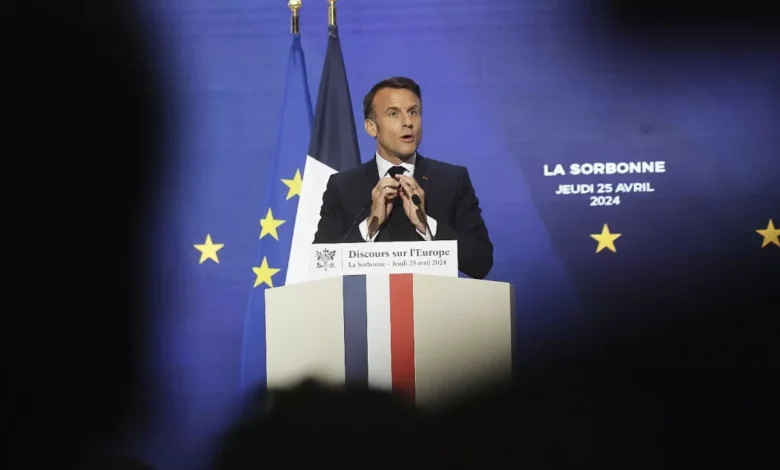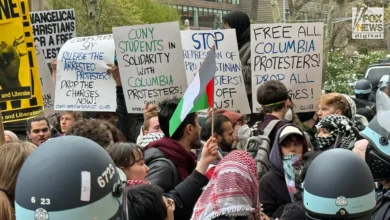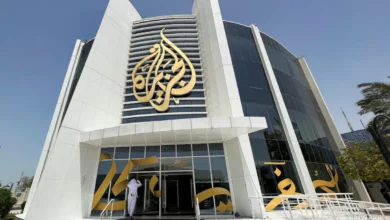‘Europe is mortal,’ Macron warns as he calls for more EU unity and sovereignty
To avoid falling behind its adversaries, the 27-country union must immediately reassess its security and economic policies, according to the French leader.

The European model is in danger of being destroyed by the US-China rivalry, and the next decade will be critical to its survival, French President Emmanuel Macron warned on Thursday, calling on the European Union to become more united and sovereign.
In a 108-minute speech at the Sorbonne, where the then-newly elected leader gave his first address on his vision for its seven years ago, Macron repeatedly stated that “the rules of the game have changed” on several fronts, including geopolitics, the economy and trade, and culture.
“We must be lucid about the fact that our Europe today is mortal. It can die. It can die and that depends solely on our choices, but those choices have to be made now,” Macron told attendees including members of his government and ambassadors from other member states.
“Gone are the days when it bought its energy and fertilisers from Russia, outsourced its production to China and delegated its security to the United States of America,” he added. Positive steps have been taken over the past few years, he noted, but he warned nonetheless that “we are not at scale”.
The war in Ukraine and its implications for European defence and security, as well as the ability of European industrial and technology actors to survive against what he regarded as the US and Chinese “over-subsidising” of their economies, were among his main worries.
To weather the new geopolitical landscape, the French president said “a credible defence of the European continent” must be built.
“Europe must know how to defend what it holds dear with its allies whenever they are prepared to do so alongside us, and alone if necessary,” he said.
“The United States of America has two priorities: firstly, the United States of America, which is legitimate, and secondly, China. And the European question is not a geopolitical priority for the years and decades to come, whatever the strength of our alliance.”
Macron identified Russia as the bloc’s major danger and asked for work on a “European defence initiative” to begin within months, initially as a “strategic concept” from which “relevant capabilities” will be implemented.
He emphasized that the European defense sector must “produce faster, more and more European” in order to do this. He underlined his opinion, which has been championed by his EU peers in recent months, that this increase in investment might be funded by generating more shared EU debt. He also reiterated his claim that there should be a “European preference” when it comes to purchasing military equipment.
The EU should also be more vocal on the diplomatic front, he said, strike more “reciprocal partnerships” with third countries “to show that it is never the vassal of the United States of America, and that it also knows how to speak to all regions of the world: to emerging countries, to Africa, to Latin America.”
Macron advocated for “simplification” or “deregulation” of rules to help European industrial actors endure “disloyal” competition from US and Chinese rivals that have benefited from massive subsidy programs.
“Our current economic model is no longer sustainable,” he told reporters.
The French leader believes the EU’s goals of becoming carbon-neutral, maintaining a socioeconomic model based on solidarity and redistribution, and increasing sovereignty in key sectors and supply chains are correct, but “we’re not there because we regulate too much, invest too little, are too open, and don’t defend our interests enough.”
The answer for him is a “prosperity pact” that would include “waves of rule simplification” over the next mandate to allow for companies to quickly scale up at the European level and an industrial policy to boost so-called green sectors. Europe, he added, should also aim to become a world leader in five key sectors including including AI, space, biotechnologies, renewables and nuclear.
The EU will need a “major collective investment plan” to achieve these goals, he said.
He came out in favour of adding a growth or climate objective to the European Central Bank’s mandate as well as raising income from EU-level taxes. He also urged work on a Capital Markets Union to be accelerated and finalised within 12 months to entice EU banks to invest European savings in homegrown products rather than foreign, usually American, ones.
You might also be interested in –After Biden withdraws, India invites French President Macron as Chief Guest for Republic Day 2024



